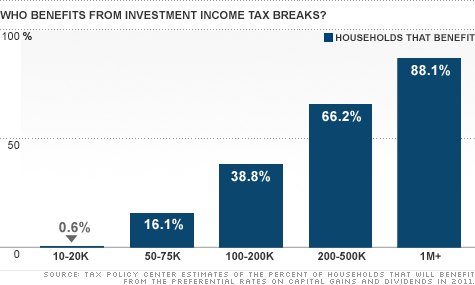How did we come to a place in America, Protestant work ethic and all, where we reward idleness and punish work?
From a Tea Party perspective, the problem is punishing wealth and giving handouts to the poor. But the problem is actually broader than that. In almost every significant economic of American life, those who clock in to do a day's work are increasingly bearing the burden of a society where everyone else gets a bye.
Taxation -- the highest taxes fall on workers.
Although I'm one of those beginning to reap the benefits of this system, I have difficulty wrapping my head around its logic. Somehow the Tea Party saw the problem but misinterpreted it, understanding that there was gross unfairness but miscalculating perhaps who the winners and losers were. But I get their point. We've become a society where those who work, those who haven't the spare time to lobby their government for consideration or to study up on the issues, are falling well behind while others increase their share of the booty by not working.
Come on, fellow progressives, we can do better than this.
From a Tea Party perspective, the problem is punishing wealth and giving handouts to the poor. But the problem is actually broader than that. In almost every significant economic of American life, those who clock in to do a day's work are increasingly bearing the burden of a society where everyone else gets a bye.
Taxation -- the highest taxes fall on workers.
If you make your living from wages, you pay up to 35% income taxes on your net income. If you make your living from investments -- capital gains and dividends -- you pay only 15%. And if you were lucky enough to inherit your wealth instead of working for it, you pay nothing.
Only those who earn wages pay Social Security and Medicare taxes. If you depend on investments instead, no extra 15% FICA/Medicare tax for you. If you're lucky enough to earn more than $110,000, you don't pay the taxes on your "extra" income.Health Care -- workers pay more for less.
If you're retired and over age 65, you're eligible for special tax deductions and credits, further reducing your taxable income.
In a previous blog post, I discussed my husband's graduation to Medicare eligibility and how superior that coverage is to my own private insurance. Medicare takes care of the retired person. Employees on the other hand are likely to have higher out-of-pocket costs for family health care. In 2011, the average working person's monthly contribution (in addition to the employer's cost) was $377 per month.
Health coverage for the poorest Americans, the disabled and for children are all subsidized. Working folks end up paying their own way, often at very high costs.Cost of Living Increases -- only for those who don't work.
Those on Social Security and military retirement received a 3.6% cost of living adjustment (COLA) this year. Public retirees in Oregon received a 1.25% COLA in 2011.
But compare that to the typical wage earner during this recession. Excluding college-educated professionals, American workers earned 4.6% LESS in 2010 than in 2007. Furlough days, layoffs, reduced hours and losses of benefits characterized both public and private sector work since the recession began. Instead of a COLA, workers received a COWA -- cost of working adjustment.Random Discounts
The elderly receive special discounts for restaurant meals, travel services, entertainment, discounted property tax amounts and much more. Why? What is it about seniors that entitles them to pay less? Shouldn't young families with children be the ones getting the discounts?These categories do not cover all the ways the non-working -- whether investors, heirs or those of us retired -- are rewarded in our society while workers get second place.
Although I'm one of those beginning to reap the benefits of this system, I have difficulty wrapping my head around its logic. Somehow the Tea Party saw the problem but misinterpreted it, understanding that there was gross unfairness but miscalculating perhaps who the winners and losers were. But I get their point. We've become a society where those who work, those who haven't the spare time to lobby their government for consideration or to study up on the issues, are falling well behind while others increase their share of the booty by not working.
Come on, fellow progressives, we can do better than this.
See also: The Simple Math of Medicare for All

